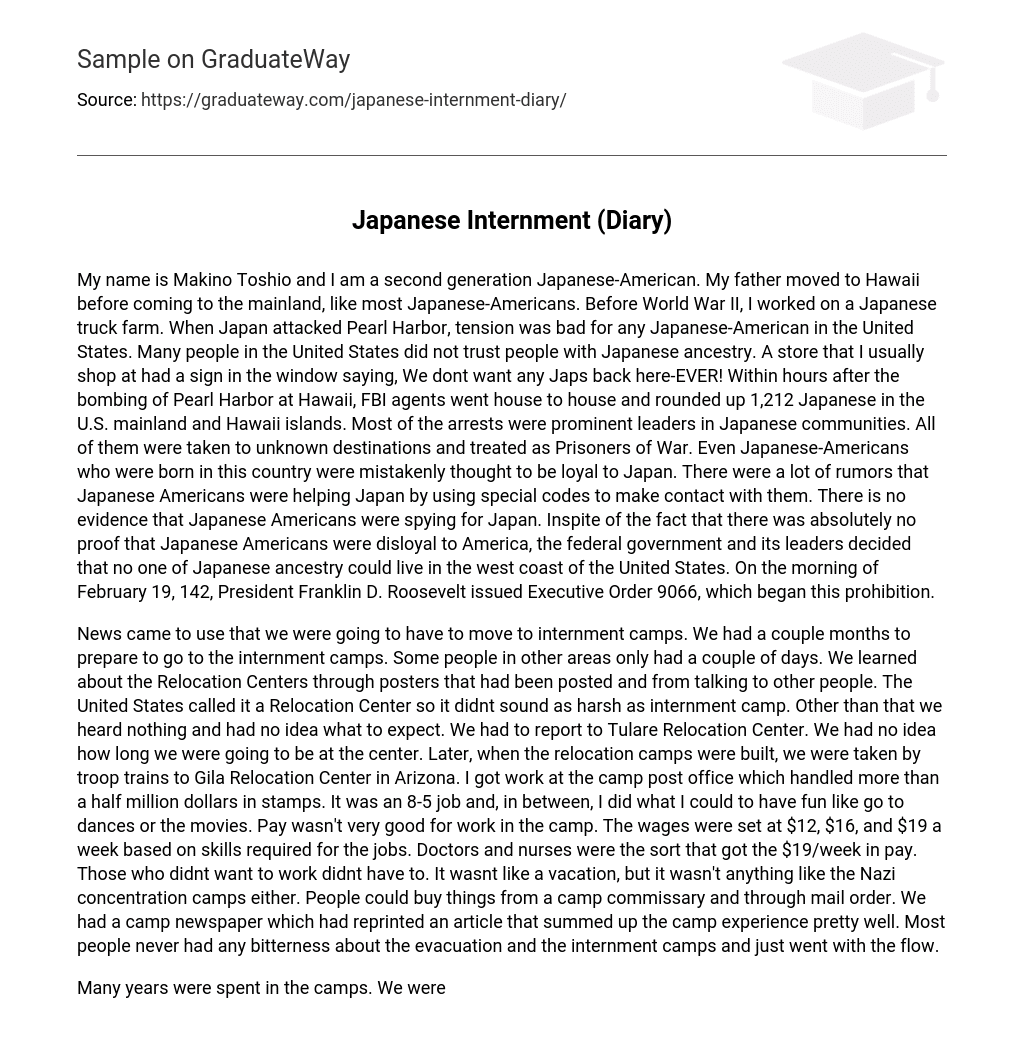My name is Makino Toshio, a second generation Japanese-American. My father migrated to Hawaii before settling on the mainland, like many others of Japanese descent. Before World War II, I worked on a Japanese truck farm. The attack on Pearl Harbor by Japan increased tensions for all individuals of Japanese ancestry in the United States. Suspicion and distrust towards them were widespread. I recall seeing a sign at a store where I usually shopped that said, “We don’t want any Japs back here-EVER!” Shortly after the bombing in Hawaii, FBI agents conducted door-to-door searches and arrested 1,212 Japanese individuals across the U.S. mainland and Hawaii islands. Many of those detained were influential leaders within their respective Japanese communities. They were then taken to undisclosed locations and treated as Prisoners of War (POWs). Even those Japanese-Americans who were born in America were mistakenly seen as loyal to Japan. Numerous rumors spread suggesting they aided Japan through secret codes for communication purposes. However, there is no evidence supporting these claims. Despite the complete lack of proof regarding disloyalty among Japanese Americans towards America, the federal government and its leaders decided that individuals with Japanese ancestry would be prohibited from living along the west coast of the United States.On February 19th, President Franklin D.Roosevelt issued Executive Order 9066 which initiated this ban.
We were given notice about our relocation to internment camps, but we had more time than others in different areas who only had a few days. We had a couple of months to get ready and we gathered information about the Relocation Centers from posters and conversations with others. The United States called them Relocation Centers instead of internment camps. Despite this knowledge, we didn’t have any expectations or know anything else. We were instructed to report to Tulare Relocation Center without knowing how long we would be there. Eventually, troop trains transported us to Gila Relocation Center in Arizona after the camps were constructed. At my job in the camp’s post office, I dealt with over half a million dollars’ worth of stamps during my 8-5 shift. In my free time, I enjoyed dances and movies. The pay for work at the camp wasn’t high – it ranged from $12 to $19 per week depending on the required skills – with doctors and nurses receiving the highest rate of $19 per week. Those who decided not to work weren’t obligated to do so. While it wasn’t like going on vacation, our experience at the camp was much better compared to conditions in Nazi concentration camps. Within the camp grounds, people could make purchases either at a commissary or through mail order. Additionally, we had a camp newspaper that accurately summarized our experiences. Most individuals didn’t harbor bitterness towards the evacuation and internment camps; they simply accepted their circumstances.
Despite spending many years in the camps, we were constantly confined by barbed wire fences, and the camps were closely monitored by armed guards. Living conditions were incredibly cramped, with my family residing in a single, small room. Access to hot water for basic hygiene and laundry was nonexistent, resulting in lice infestations being a common issue. Due to the overwhelming circumstances, I was unable to dedicate enough time to my children, depriving them of the love and care they greatly required.
Life in the camps presented a comparatively easier experience for women as most of them found employment within the work corps. They had the opportunity to attend various classes including English, flower arrangement, sewing, and Japanese music specifically tailored for their needs. These classes took place in the evenings after work and were particularly popular among women, including my wife. Conversely, the men residing in the relocation center suffered the most from these circumstances. Despite my relentless efforts to improve conditions for my family within the center, I felt powerless and overwhelmed by a sense of uselessness. Although I never lost my love and concern for my loved ones, the inability to make a significant difference weighed heavily on me.





